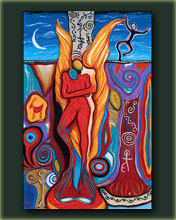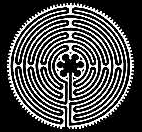In the main, the two systems hold to the same outlook
That man occupies an important position in creation little guessed and less explored by western science.
That the cosmos is arranged in a structure of hierarchical realms of ascending refinement.
That few things are what they seem at any level.
That, to varying degrees, all of us are locked in a deep sleep continuously induced and reinforced by the dazzling and relentless evidence of our five senses.
The Human ConditionMan, without the benefit of special guidance, will inevitably degenerate into a state lower than that of the animals. Messengers are sent from time to time to reverse this descent and remind us of our rightful place in the universe. Upon registering the significance of one of these messages, a man or a woman may embark upon a journey with the possibility of deliverance from this general downward drift. Paradoxically, a successful journey leads the traveller to the origin of his being as well as a completely altered state of being.
The actual significance of mankind has been almost completely misread by the sciences and humanities of the west. We are, in short, a kind of cosmic bet that the Absolute can create something from nothing where the "nothing" contributes, to some extent, in the process.
The GuideBoth paths require experienced guides to show the way. The general notion is, not unreasonably, that a specialist is needed to practice a specialty.
A patient requiring surgery will not, under most circumstances, consult a rock star to remove his gallstones. Just as surgeons must graduate from accredited institutions, so guides must be, without exception, products of a chain of continuous transmission from a genuine source of higher knowledge. The soundness of the chain determines the quality of the teaching. Broken chains are broken paths and lead either in circles or to places worse.
Each link in this living chain confirms and tests the strength of the link he forges with his successor. Attempts at self-initiation on either of these two paths lead to predictable fiascoes. Observe the geographically confused devotee who emerges from a few weeks at Esalen to declare that he has found his way to the Sarmoun Monastery and is receiving daily instructions from a member of the Inner Circle of Humanity.
Both paths encounter considerable resistance on the matter of the guide. Western sophisticates generally exhibit a marked distaste for mystical masters of any sort, Gurdjieff included. The idea that the person sitting next to you on a train might possess a completely different order of being from your own seems unlikely, undemocratic, even unfair.
This is not surprising in a society where most public figures carry out their larger-than-life existences with every foible and misdeed aired on the evening news. There are few obvious examples of trustworthy leaders of any sort. On the other side of the equation within the Islamic world, fundamentalists are now noisily asserting that spiritual guides are forbidden in general, and Sufi Shaykhs in particular - this, after more than a thousand years of sweeping spiritual authority held by the forty Sufi orders.
AwarenessA number of exercises prescribed for both Gurdjieff students and Naqshbandi murids (followers) are designed to increase self-awareness. Gurdjieff admonished his followers to "self remember" as much as they possibly could. In one of his later writings he shared his frustrations in trying to practice the art himself and revealed the lengths to which the exercise could be extended.
The eleventh Grand Shaykh of the Naqshbandi Order, Khwaja Abdul Kaliq al-Ghujdawani, taught eight methods of consciousness which have since become principles of the order. This Twelfth Century teacher described techniques which have caught the attention of many Gurdjieff followers for here, couched in spiritual terms, is a intense and exact prescription for consciousness.
Self knowledge brings another kind of awareness, and generally runs along two lines of work: learning about the general case of mankind as it relates to the cosmos as a whole and discovering the unsettling specifics of one's own weaknesses. Nomenclature, cultural references and imagery vary greatly between the Gurdjieff and Naqshbandi Ways, but initially both seem to focus on setting your house in order in the ordinary sense before proceeding on to bigger things.
Non-identification is the method used to bridge the second gap in the Gurdjieff food octave. "Life" concerns are generally considered distractions along the path, but also the propulsion fuel for the traveller who wishes to move beyond sense-based reality. Sufis in general view dunya (the material world) as something not quite real, but again, as something dangerously distracting. Both systems put forth extensive elaborations of the degrees of materiality and reality which span the universe, and to some extent both define an individual based on his orientation within these ranges.
Rules of the PathPupils in the Gurdfjieff tradition soon grow accustomed to the notion that in order to become free of the lowering effects of mechanical laws at this particular location in the ray of creation, one must temporarily submit to artificial rules, beyond what nature imposes on the general population. Sufis, (traditional ones, that is), likewise submit to the Islamic law of Shariah, a system of rules established by the Prophet Muhammad (may peace be upon him) over a period of 23 years. More than a billion Muslims, including Sufis, are obligated to observe these practices to the best of their abilities. Both rules systems are rigorous behavioral directives and would constitute a major undertaking in any setting, in any age.
CosmologiesBoth traditions present robust cosmologies, vast in scope and rich in detail. The Gurdjieff pupils study a system of knowledge which is at once startling in its precision and reassuring in its internal coherence. More and more western intellectuals are attracted to this system because of the remarkable success that Ouspensky had in capturing Gurdjieff's cosmology in a systematized presentation. Indeed, it is this very well worked out model of the universe that is the centerpiece of Gurdjieff's contribution to Twentieth Century mysticism.
Throughout known history many great teachers have alluded to the fact that man is a replica of the universe in miniature, but no other known system has gone so far in filling in the specific details of just how this might be the case and what the key replicating pattern might be. This system is so compelling in its completeness and detail that a whole school of writers has emerged over the last fifty years to work out its correspondences with the natural sciences and many other disciplines.
Similarly, the Sufis draw on the Quran, which in some sense is an intricate and tightly compacted summation of man's possibilities in the current era. Its various chapters allude to the Seven Heavens and the Four Gardens of Paradise discussed in a section of this site, The Mullah and the Moon. Significantly, much of the Sufi teaching is spoken, and when an inspired shaykh expounds on the heavens and the earth, it is often a onetime event - the vision of man's place in the world is summoned in a way appropriate to the moment and that moment alone.
Like the Gurdjieff system, Sufi teachings on the cosmos are always precise and framed from the point of view of the spiritual dimensions of man and his correct orientation in Allah's overall creation.
UniversalityBoth traditions are framed within a universal context. Gurdjieff's underlying assumption is that the laws he described are nothing less than the underpinnings of creation. The laws discovered by modern science are but a small and imperfectly perceived instance of this larger set. Mankind on earth is merely the local instance of the universal classification of self-evolving organisms - the biped mammal is simply the current terrestrial vehicle. Similarly, the Prophet Muhammad (peace be upon him) is reported to have said, "Before the Adam known to us God created a hundred thousand Adams."
A case of mistaken identityBoth teachings address the identity of man in terms of our disastrous sense of self. Gurdjieff pupils learn an elaborate and compelling set of teachings on false personality and multiple "I's" set against the background of the machinery of the centers. The general idea is that for most of us, nobody's at home because our internal landscape is in total disarray. To add to the confusion, our fragmented beings are continually bombarded by external stimuli via the five senses. We live in a state of kaleidoscopic fascination, and the moments of our lives are drained away to little purpose.
The Sufi's similarly fight against the Nafs (ego) and maintain an arsenal of techniques to overcome and even reverse the ill effects of its utter mastery over us. We have eternal selves which are continuously in the divine presence, but stranded on this sad planet, we have forgotten this aspect of our existences and the connection to these higher selves has become attenuated. Both systems teach that there are higher functions within us that may be activated after a great deal of hard work on this problem of identity.
''They open doorways that I thought were shut for good. They read me Gurdjieff
and Jesu. They build up my body, break me emotionally. It's nearly killing me,
but what a lovely feeling!I love the whirling of the dervishes. I love the
beauty of rare innocence. You don't need no crystal ball, Don't fall for a magic wand. We humans got it all, we perform the miracles.''



